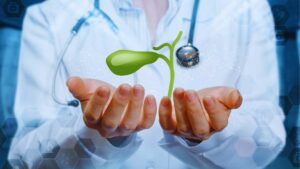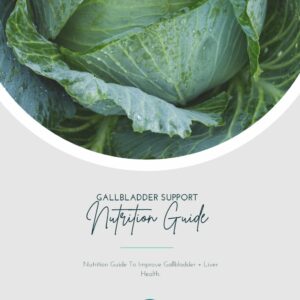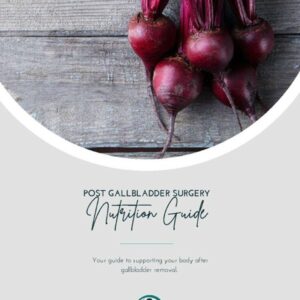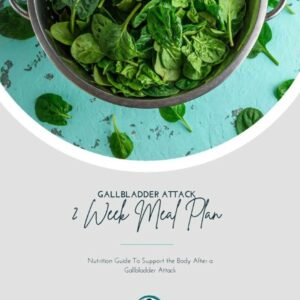9 Side Effects of Gallbladder Removal
 If you’re someone struggling with frequent gallbladder attacks or frequent gallbladder pain, your doctor may recommend a gallbladder removal surgery– also known as a cholecystectomy. Because the gallbladder aids in the breakdown of fats in the digestive system, it takes your body time to adjust to not having this organ.
If you’re someone struggling with frequent gallbladder attacks or frequent gallbladder pain, your doctor may recommend a gallbladder removal surgery– also known as a cholecystectomy. Because the gallbladder aids in the breakdown of fats in the digestive system, it takes your body time to adjust to not having this organ.
Complications may occur when you’re recovering from any surgery, but I want to touch more specifically on those related directly to your gallbladder health. As a holistic nutritionist focusing on all things gallbladder, I’ve guided several of my clients through preparing for and recovering from gallbladder removal surgery. And they need to continue to implement a healthy and balanced diet and lifestyle after the procedure.
Gallbladder disease– even with removal– requires long-term diet and lifestyle adjustments.
So, let’s prepare you for any potential complications post-cholecystectomy. I want to make your recovery as seamless as possible. Being aware of potential side effects after a gallbladder removal surgery lets you be more prepared during your recovery!
When Is Gallbladder Removal Indicated?
Diet and lifestyle changes can sometimes prevent you from having to go through with gallbladder removal surgery. Unfortunately, that’s not the case for a lot of people struggling with symptoms.
Those who do need to get their gallbladder removed likely are dealing with
- Repeated gallbladder attacks
- Gallstones
- Recurring gallbladder pain or biliary colic
- Likelihood of severe complications due to an improperly functioning gallbladder
Biliary colic is a sharp pain in the right upper abdomen that’s often caused by gallstones in the cystic duct or common bile duct. If biliary colic is chronic, gallbladder surgery is usually recommended for relief.
So what does life after gallbladder surgery look like? Gallbladder surgery in most cases fixes gallbladder pain and attacks. However, maintaining a balanced lifestyle during recovery is crucial in preventing potential issues.
Significant Side Effects of Gallbladder Removal
As with any surgery, there are post-op guidelines for complications that can arise. Having your gallbladder removed can come with lots of different side effects throughout recovery. Here are 9 common side effects of a cholecystectomy:
Post-Cholecystectomy Syndrome (PCS)
Up to 30% of gallbladder removal patients experience post-cholecystectomy syndrome (PCS). PCS may feel like a gallbladder attack with symptoms like upper right abdominal pain and digestive symptoms.
Additional symptoms of PCS include
- Fatty food intolerance
- Nausea and vomiting
- Heartburn
- Gas
- Indigestion
- Diarrhea
- Jaundice
- Intermittent abdominal pain
PCS may come on quickly after gallbladder removal surgery, or it may show up months to years later.1
If you’ve gone through a gallbladder removal surgery, and you’re still struggling with concerning symptoms like those listed above, it’s important to consult with a gastroenterologist for testing and diagnosis.
Risk of Metabolic Syndrome
Gallbladder removal increases the risk of metabolic syndrome. Metabolic syndrome is a combination of conditions that increase the risk of diabetes, heart disease, and stroke. These conditions include:
- Extra weight around the midsection
- High blood pressure
- High blood sugar
- High triglycerides and low HDL (“good”) cholesterol
Since the gallbladder is involved in bile storage and dietary fat metabolism, gallbladder removal can result in abnormal glucose metabolism, insulin resistance, blood lipid metabolism, and fatty liver, resulting in metabolic syndrome.2,3
Bile Reflux
Bile reflux occurs when bile flow backs up into the stomach and esophagus. It occurs more often in people who have had their gallbladder removed.
Bile reflux may feel very similar to gastric acid reflux with symptoms like
- Upper abdominal pain
- A burning sensation in the chest
- Nausea or vomiting
- Cough or hoarseness
- Unintentional weight loss. 4
Bile Acid Diarrhea/Malabsorption
Up to 20% of patients with their gallbladder removed will develop bile acid diarrhea.
Typically, this resolves quickly. But for some, it’s chronic. While the cause isn’t clear, it’s likely an increase in bile and bile acids in the large intestine has a laxative effect.5,6
Maintaining a balanced, fibrous, whole-food diet, and staying hydrated can help keep this symptom at bay.
Some of my favorite meals to prevent bile acid diarrhea are
- Turkey with sweet potato
- Carrots and hummus
- Salmon with quinoa and green beans
- Chicken with wild rice
Adjusting your diet, lifestyle, and stress levels can reduce this unwanted symptom. Additionally, limit or avoid gut stressors like coffee, gluten, sugar, and alcohol to keep bile acid diarrhea at a minimum.
Sphincter of Oddi Dysfunction
The sphincter of Oddi is a muscular valve that allows bile and pancreatic juice to flow into the small intestine.
10-20% of cholecystectomy patients will still experience pain after gallbladder removal and the sphincter of Oddi dysfunction is a possible cause. Severe abdominal pain can result from this backup of digestive juices.7
Bile Duct Stones
Stones may still form in the bile duct after gallbladder removal. Even after gallbladder removal surgery, studies show 25% of patients experience recurrent bile duct stones.8
Bile duct stones can cause abdominal pain, nausea, vomiting, or fever. It also can lead to elevated levels of bilirubin or liver enzymes.
Having a balanced diet post-op is still important. Focus on anti-inflammatory herbs and foods for pain. With no relief, consult with a doctor if you continuously feel symptoms of bile duct stones.
Pancreatitis
Pancreatitis causes pain and inflammation in the pancreas. It’s a serious condition that can lead to organ failure and in some cases fatal consequences. It usually requires hospitalization for close monitoring.
Symptoms of pancreatitis include
- Intense pain in the upper left abdomen or back that radiates outward
- Nausea and/or vomiting
- Fever or chills
- Jaundice
The most common cause of acute pancreatitis is gallstones blocking the pancreatic duct as they travel to the small intestine.
Gallbladder removal is a recommended treatment for gallstone pancreatitis, but bile duct stones can still cause pancreatitis once the gallbladder is removed. 9,10
Constipation
Constipation can happen after gallbladder surgery– like any surgery. Through the recovery, you’ll be prescribed pain medications that have a constipating effect.
Constipation can also occur due to changes in concentrated bile post-surgery.
It’s temporary and should resolve with time. But the best way to improve this symptom is by eating plenty of fiber and drinking roughly half your body weight in ounces of water each day. 11 (So– if you weigh 160 pounds, try to drink 80 ounces of water daily).
Bile Dumping
The gallbladder regulates the flow of bile after a meal. Without the gallbladder, there’s an increase in bile and bile acids, which have a laxative effect.
Bile dumping can occur resulting in diarrhea and difficulty digesting fatty foods.5,6
Ways to prevent symptoms from bile dumping include
- Eating a low-fat diet
- Incorporating lean proteins
- Avoiding processed foods
Diet After Gallbladder Removal
Your doctor may or may not tell you that you can eat whatever you want post-surgery– but this is not something I recommend. Your diet after gallbladder removal surgery should be balanced with low-fat whole foods.
Living a normal life after gallbladder removal surgery is totally doable. However, without a gallbladder, you must be aware of how to best manage it.
Want to feel more freedom in your food choices post-op?
I’ve crafted a nutrition guide designed for post-gallbladder removal surgery. This guide allows you to nourish your body with exactly what it needs when you’re recovering from gallbladder removal surgery. It provides you with a gut and liver-supportive grocery list, recipes, and lifestyle tips. So check it out to promote your health without a gallbladder!
How to Best Prevent Gallbladder Removal Side Effects
Maybe you’re scheduled for a gallbladder removal surgery and ready to improve your long-term health. Or maybe you’ve already gone through this surgery and need more confidence in your diet choices to benefit your body. Whatever the case may be, I also offer you to join me in the gallbladder removal reset.
It’s a step-by-step program to help you work through your gallbladder removal to reset your digestion and get your lifestyle back on track. You’ll understand how to support your body and long-term goals without super restrictive diets.
If you’ve already gone through gallbladder removal surgery and have overcome these potential side effects, comment below with what worked and didn’t work for you! Other readers who are going through the same thing will appreciate your input.
Hopefully having a better understanding of what to expect after gallbladder removal surgery will let you feel more prepared. If you’re struggling with any of these symptoms or digestive programs, please contact me so we can work through your symptoms together.
As always, I’m rooting for you. I’m here to help you optimize your health to feel as best as possible throughout your entire pre- and post-operative journey.
References
| 1. | Zackria R, Lopez RA. Postcholecystectomy Syndrome. In: StatPearls [Internet]. StatPearls Publishing; 2022. |
| 2. | King JE. What is metabolic syndrome? Nursing. 2006;36(6):31. doi:10.1097/00152193-200606000-00022 |
| 3. | Di Ciaula A, Garruti G, Wang DQH, Portincasa P. Cholecystectomy and risk of metabolic syndrome. Eur J Intern Med. 2018;53:3-11. doi:10.1016/j.ejim.2018.04.019 |
| 4. | Bile reflux. Mayo Clinic. Published January 6, 2022. Accessed December 1, 2022. https://www.mayoclinic.org/diseases-conditions/bile-reflux/symptoms-causes/syc-20370115 |
| 5. | Farrugia A, Attard JA, Hanmer S, et al. Rates of bile acid diarrhea after cholecystectomy: A multicentre audit. World J Surg. 2021;45(8):2447-2453. doi:10.1007/s00268-021-06147-8 |
| 6. | Chronic diarrhea: A concern after gallbladder removal? Mayo Clinic. Published September 29, 2021. Accessed December 1, 2022. https://www.mayoclinic.org/tests-procedures/cholecystectomy/expert-answers/gallbladder-removal/faq-20058481 |
| 7. | Sphincter of Oddi dysfunction. IFFGD. Accessed December 1, 2022. https://iffgd.org/gi-disorders/sphincter-of-oddi-dysfunction/ |
| 8. | Zhou B, Hu J, Zhong Y. Surgical treatments for patients with recurrent bile duct stones and Oddi’s sphincter laxity. Intractable Rare Dis Res. 2017;6(3):172-176. doi:10.5582/irdr.2017.01053 |
| 9. | Umans DS, Hallensleben ND, Verdonk RC, et al. Recurrence of idiopathic acute pancreatitis after cholecystectomy: systematic review and meta-analysis: Recurrence of idiopathic acute pancreatitis after cholecystectomy. Br J Surg. 2020;107(3):191-199. doi:10.1002/bjs.11429 |
| 10. | Gallstone pancreatitis. Hopkinsmedicine.org. Published November 19, 2019. Accessed December 1, 2022. https://www.hopkinsmedicine.org/health/conditions-and-diseases/gallstone-pancreatitis |
| 11. | Sizar O, Genova R, Gupta M. Opioid Induced Constipation. In: StatPearls [Internet]. StatPearls Publishing; 2022. |


